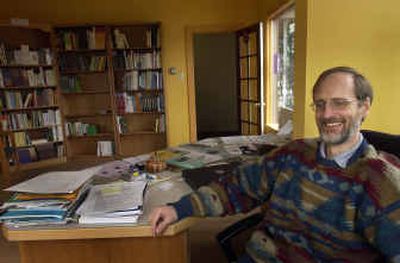Eco-Center models its goals

CLARK FORK, Idaho – The mission statement for the Inland Northwest Eco-Center puts it succinctly: Empowering individuals and communities to create sustainable ways of living.
“If you don’t have a lot of money, you can still live a good life and don’t have to run, run, run just to make a living,” said Richard Kuhnel.
He started the Inland Northwest Eco-Center along with Gentle Harvest and knows whereof he speaks.
Kuhnel left a high-pressure computer job to follow a long-held dream of living more lightly on the land. “I also wanted to be more active in the community,” he said.
He soon realized the need to provide a central facility where people could gather to discuss, learn and share their ideas and experiences about creating environments and livelihoods that sustain the Earth.
With that in mind, he purchased a two-story 1907 house in downtown Sandpoint. He began renovations with attention to the use of non-toxic materials. These included toxic-free paint and safe, asbestos-free insulation. He re-used what he could, including nails. And since his philosophy includes an emphasis on recycling and giving things away, what he could not use he passed on to others. He installed low-energy light bulbs.
In addition to creating a drop-in friendly dwelling for people seeking information on how to live meaningful lives with minimal stress, Kuhnel offers local and Internet-accessible information on where to purchase non-toxic materials. The center includes a meeting room that is available for anyone interested in offering related classes. Also available are high-speed Internet access and books on a variety of subjects. Through the Eco-store ( ecostore@gentleharvest.org) he sells books with titles that range from “Worms Eat Your Garbage” to “The Natural Plaster Book.”
His newsletter ( resources@gentleharvest.org) provides information on subjects that include everything from water to the economy. Kuhnel’s computer background enables him to offer consulting services that include the appropriate use of technology. He also supports and promotes local groups such as the North Idaho Public Forum on Sustainability (PFOS).
In the 1980s, Kuhnel was living in Germany, where he read “One Straw Revolution,” by Masanobu Fukuoka. For its time, this was a landmark book that promoted farming and gardening without plowing or poisoning the soil. “I felt a deep draw to live like that,” said Kuhnel.
Nevertheless he found himself “on a two-track career,” he said. One career involved the need to make money through his expertise in computer technology. The other track involved his desire to develop ideas that would “limit man’s impact on the Earth and at the same time provide a sustainable income.”
By sustainable income, Kuhnel means to “put in place a system that is self-maintaining” and that can, at the same time, provide a surplus to help others.
After Kuhnel met Berta, now his wife, at a conference in Europe, he left the growing software company that he had helped start in Germany and joined Berta in Colorado. Together they relocated to Sandpoint in 1995. Berta is a licensed acupuncturist with a private practice.